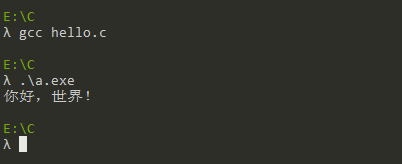当我们使用MinGW-w64作为编译器在windows系统环境下进行C语言编程时,如果源代码文件(.c)保存格式为Ansi格式,则在打印汉字时不会出现乱码;反之,如果我们使用UTF-8格式保存,则会出现乱码,需要在编译时加上“-fexec-charset=gbk”来解决乱码问题。
#include <stdio.h> int main() { printf("%s ", "你好,世界!"); return 0; }




那么,当我们使用C语言处理文件时,如果文件格式是UTF-8,如何转换成Ansi格式呢?注意:在windows下,txt的保存格式中有UTF-8和带有BOM的UTF-8两个选项。如果选择带有BOM的UTF-8选项,则在读取文件时会首先读到三个标志着这个文件是由UTF-8格式编码的字符,分别为EF BB BF。如果选择UTF-8,则不会有这三个字符,而是直接一开始就读到文件本身内容。详情请看:https://blog.csdn.net/wang544831183/article/details/82349668


1 // char.h 2 // 头文件 3 // 定义结构体File,存储文件信息 4 // 定义结构体初始化函数以及其他函数 5 6 #ifndef _H_CHAR_ 7 #define _H_CHAR_ 8 9 #include <stdio.h> 10 #include <stdbool.h> 11 #include <stdlib.h> 12 #include <windows.h> 13 14 unsigned char BOM[] = {0xEF, 0xBB, 0xBF}; // 带有BOM的UTF-8编码格式的文件会以这三个字符开头 15 16 // File结构体定义 17 typedef struct file { 18 char *filename; 19 char *filemode; 20 char *encoding; 21 bool readable; 22 } File; 23 24 // 函数定义 25 File *initializeFile(char *, char *); // 初始化结构体 26 bool isUTF8(char *); // 判断文件是否为UTF-8编码格式 27 bool isReadable(char *); // 判断filemode是否支持可读选项 28 bool charInString(char, char *); // 判断字符是否在字符串中 29 void fprint(File *); // 打印结构体内容 30 void fprintInfo(File *); // 打印结构体信息 31 void deconstructFile(File *); // 析构化结构体 32 void fprintAnsi(File *); // 以Ansi格式打印 33 // 转换函数定义 34 void Convert(const char* strIn, char* strOut, int sourceCodepage, int targetCodepage); 35 void UTF82Ansi(PCHAR Src, PCHAR Dst); 36 void Ansi2UTF8(PCHAR Src, PCHAR Dst); 37 38 // 函数实现 39 File *initializeFile(char *filename, char *filemode) 40 { 41 File *file = (File *)malloc(sizeof(File)); 42 file->filename = filename; 43 file->filemode = filemode; 44 file->encoding = "Ansi"; 45 file->readable = false; 46 47 if (isUTF8(filename)) 48 { 49 file->encoding = "UTF-8"; 50 } 51 52 if (isReadable(filemode)) 53 { 54 file->readable = true; 55 } 56 57 return file; 58 } 59 60 bool isUTF8(char *filename) 61 { 62 FILE *fp = fopen(filename, "r"); 63 64 if (fp == NULL) 65 { 66 printf("Unable to open file %s ", filename); 67 return false; 68 } 69 70 unsigned char *buffer = (unsigned char *)malloc(sizeof(unsigned char) * 3); 71 fread(buffer, 3, 3, fp); 72 fclose(fp); 73 74 for (int i = 0; i < 3; i++) 75 { 76 if (buffer[i] != BOM[i]) 77 { 78 return false; 79 } 80 } 81 82 return true; 83 } 84 85 bool isReadable(char *filemode) 86 { 87 if (charInString('r', filemode) || charInString('+', filemode)) 88 { 89 return true; 90 } 91 return false; 92 } 93 94 bool charInString(char ch, char *str) 95 { 96 while (*str != '�') 97 { 98 if (ch == *str) 99 { 100 return true; 101 } 102 ++str; 103 } 104 return false; 105 } 106 107 void fprintInfo(File *file) 108 { 109 printf("filename: %s filemode: %s encoding: %s readble: %d ", file->filename, file->filemode, file->encoding, file->readable); 110 } 111 112 void fprint(File *file) 113 { 114 // 只有filemode中存在'r'或者'+'字符时,才可以调用fprint函数 115 if (!file->readable) 116 { 117 return; 118 } 119 120 FILE *fp = fopen(file->filename, file->filemode); 121 char chr; 122 123 if (fp == NULL) 124 { 125 printf("Failed to open file %s ", file->filename); 126 return; 127 } 128 129 while ((chr = fgetc(fp)) != EOF) 130 { 131 printf("%c", chr); 132 } 133 134 puts(""); 135 fseek(fp, 0, SEEK_SET); // 重置到开头 136 137 while ((chr = fgetc(fp)) != EOF) 138 { 139 printf("%x ", (unsigned char)chr); 140 } 141 printf(" "); 142 143 fclose(fp); 144 } 145 146 void deconstructFile(File *file) 147 { 148 free(file); 149 file = NULL; 150 } 151 152 void fprintAnsi(File *file) 153 { 154 if (!file->readable) 155 { 156 return; 157 } 158 if (file->encoding == "Ansi") 159 { 160 fprint(file); 161 } 162 else 163 { 164 FILE *fp = fopen(file->filename, file->filemode); 165 166 int i = 0; 167 char ch; 168 char utf8[MAX_PATH] = {0}; 169 char ansi[MAX_PATH] = {0}; 170 171 // 跳过头三个BOM字符 172 fseek(fp, 3, SEEK_SET); 173 while ((ch = fgetc(fp)) != EOF) 174 { 175 utf8[i++] = ch; 176 } 177 utf8[i] = '�'; 178 UTF82Ansi(utf8, ansi); 179 printf("%s ", ansi); 180 181 fclose(fp); 182 fp = NULL; 183 } 184 } 185 186 // 编码格式转换函数 187 void Convert(const char* strIn, char* strOut, int sourceCodepage, int targetCodepage) 188 { 189 int len = lstrlenA(strIn); 190 int unicodeLen = MultiByteToWideChar(sourceCodepage, 0, strIn, -1, NULL, 0); 191 wchar_t pUnicode[1024] = {0}; 192 MultiByteToWideChar(sourceCodepage, 0, strIn, - 1, (LPWSTR)pUnicode, unicodeLen); 193 194 BYTE pTargetData[2048] = {0}; 195 int targetLen = WideCharToMultiByte(targetCodepage, 0, (LPWSTR)pUnicode, -1, (char*)pTargetData,0, NULL, NULL); 196 WideCharToMultiByte(targetCodepage, 0, (LPWSTR)pUnicode, -1,(char*)pTargetData, targetLen, NULL, NULL); 197 lstrcpyA(strOut,(char*)pTargetData); 198 } 199 void UTF82Ansi(PCHAR Src, PCHAR Dst) 200 { 201 Convert(Src,Dst,CP_UTF8,CP_ACP); 202 } 203 void Ansi2UTF8(PCHAR Src, PCHAR Dst) 204 { 205 Convert(Src,Dst,CP_ACP, CP_UTF8); 206 } 207 208 #endif

1 #include "char.h" 2 3 int main() 4 { 5 File *ansi = initializeFile("ansi.txt", "r"); 6 fprintInfo(ansi); 7 fprint(ansi); 8 deconstructFile(ansi); 9 10 File *utf8 = initializeFile("utf-8-bom.txt", "r"); 11 fprintInfo(utf8); 12 fprint(utf8); 13 fprintAnsi(utf8); 14 deconstructFile(utf8); 15 16 return 0; 17 }

